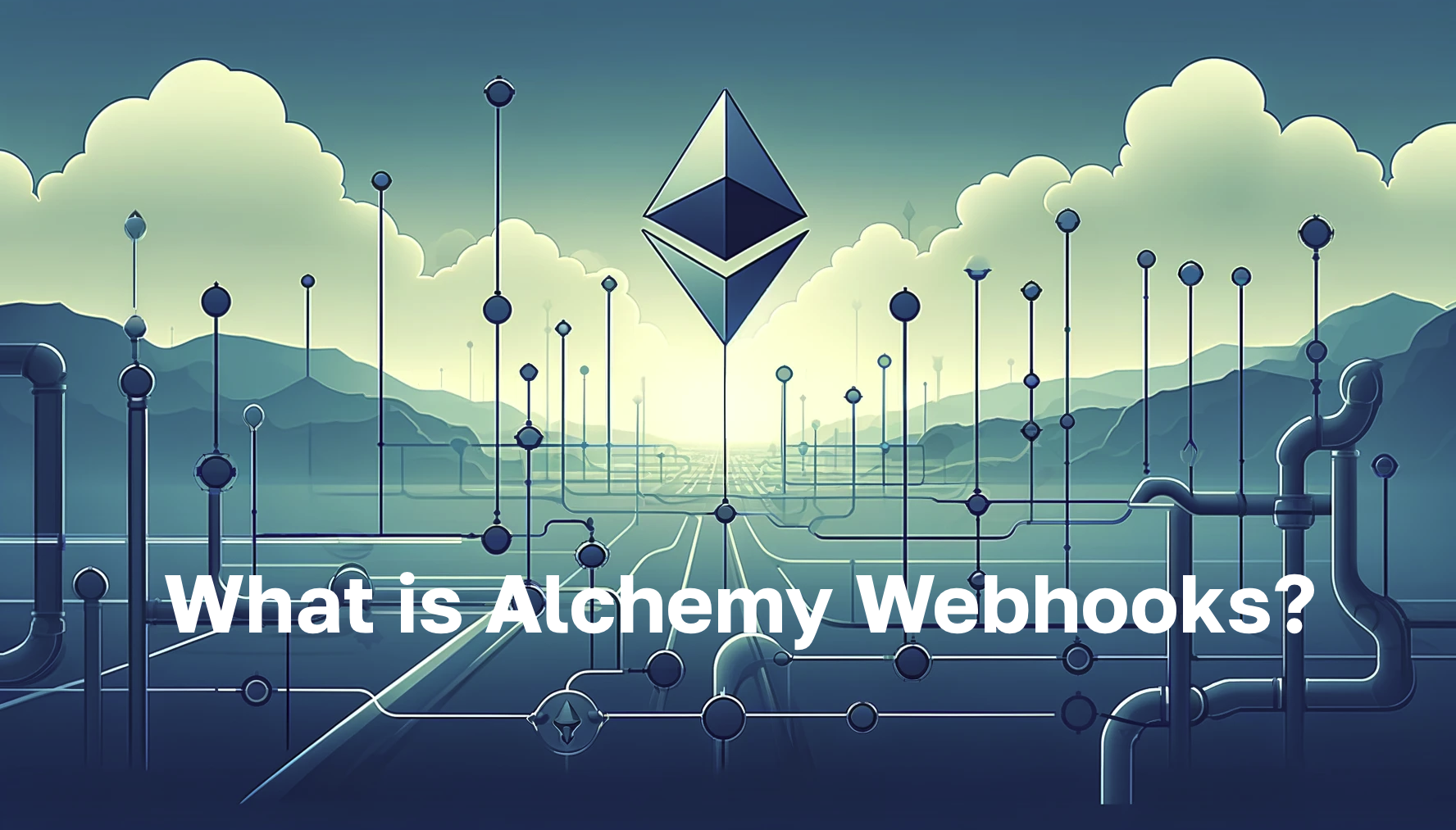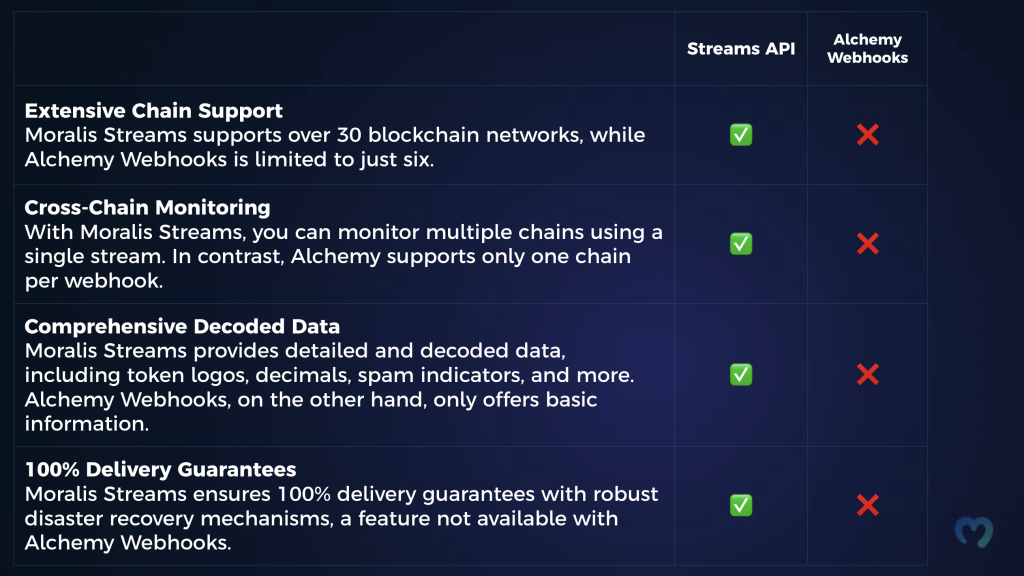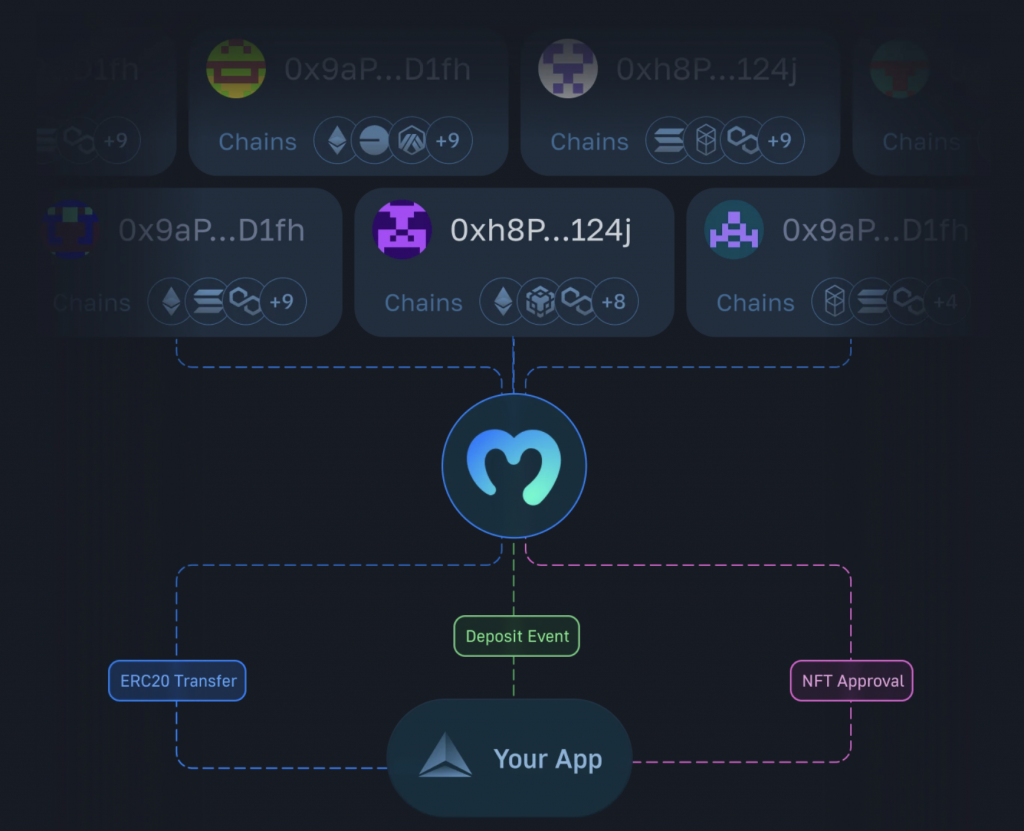Did you know that Moralis’ Streams API offers a superior real-time Web3 data solution compared to Alchemy Webhooks? With our intuitive user interface, you can seamlessly set up streams with just a few clicks. As such, it’s now simpler than ever to monitor wallet and smart contract events. If you’re eager to dive right in and learn more, here’s a table highlighting the main benefits of the Streams API compared to Alchemy Webhooks:
If you want a more in-depth breakdown of the table above, join us in this article as we lay it all out for you!
Ready to start using the Streams API? Sign up with Moralis today. Creating an account is free, giving you immediate access to our top-tier development tools!
Overview
Alchemy Webhooks offers a robust real-time Web3 data solution for monitoring on-chain events. However, there are several important limitations to this service. Firstly, Alchemy Webhooks supports only six blockchain networks. Additionally, it restricts users to monitoring one chain per stream. This makes tracking assets across multiple blockchain networks both a time-consuming and resource-intensive process. But there has to be a better way, right? Enter Moralis’ Streams API, the industry’s top real-time Web3 data solution!

But what exactly is the Streams API, and why is it a superior alternative to Alchemy Webhooks? If you’re seeking answers to these questions, join us in this article as we delve into the details. Let’s dive in!
What is Alchemy Webhooks?
Alchemy Webhooks is a real-time Web3 data solution offered by Alchemy. With this service, developers can set up alerts to receive real-time updates whenever certain on-chain events occur. As such, when using Alchemy Webhooks, it’s possible to build more responsive and interactive decentralized applications (dapps)!

So, what can you monitor with Alchemy Webhooks?
- Mined Transactions: Get notified when transactions get mined.
- Dropped Transactions: Get alerts when transactions get dropped.
- Address Activity: Track ETH, ERC-20, ERC-721, and ERC-1155 transfers.
- NFT Activity: Monitor ERC-721 and ERC-1155 token contracts.
- NFT Metadata Updates: Track metadata updates for ERC-721 and ERC-1155 token contracts.
- Custom Webhooks: Monitor custom events for smart contracts and marketplaces.
That gives you an overview of Alchemy Webhooks. Let’s now explore some of the main limitations of this service!
What are the Limitations of Alchemy Webhooks?
Alchemy Webhooks is a solid real-time Web3 data solution. However, it’s not without flaws. As such, let’s explore three significant limitations of Alchemy Webhooks you should consider:
- Limited Chain Support: Alchemy Webhooks is limited to only six blockchain networks. Some prominent examples include Ethereum, Polygon, and Optimism.
- Single Chain Monitoring: With Alchemy Webhooks, it’s only possible to monitor one chain per stream. This means developers must set up a new stream for each chain they intend to interact with.
- Basic Data: The data provided by Alchemy Webhooks is limited. For instance, when monitoring token transfers, the responses don’t contain metadata like token logos, decimals, symbols, etc.
Considering these limitations, we’ll now explore the industry’s leading Alchemy Webhooks alternative: Moralis’ Streams API!
Introducing Moralis’ Streams API – The Ultimate Alchemy Webhooks Alternative
Moralis’ Streams API is the leading real-time data solution in the industry. Our user-friendly interface allows you to easily set up streams to monitor wallet and smart contract events with the click of a few buttons. This makes it simpler than ever to track on-chain activity and create more engaging and interactive dapp experiences!

What are the main benefits of the Streams API?
- Impressive Chain Support: The Streams API supports 30+ chains, allowing you to seamlessly set up streams for all major networks, including Ethereum, Polygon, BNB Smart Chain (BSC), and many more.
- Cross-Chain Monitoring: With the Streams API, you can monitor multiple chains with a single stream, eliminating the need to set up a new one for each network you intend to interact with.
- Enriched & Decoded Data: Moralis offers the industry’s most comprehensive API responses, providing fully enriched and decoded data payloads. For instance, when monitoring ERC-20 transfers, you receive token logos, decimals, symbols, and more.
- 100% Delivery Guarantees: In the event your project experiences downtime, Moralis ensures that all data is securely backed up and fully replayable, offering 100% delivery guarantees.
- Unparalleled Scalability: The Streams API is designed to be scalable, enabling you to monitor from one to 100 million addresses in a single stream without any loss in performance.
This gives you an overview of the Streams API. In the next section, we’ll compare our industry-leading tool to Alchemy Webhooks to highlight the main differences between the solutions.
Complete Comparison: Moralis’ Streams API Vs. Alchemy Webhooks
Here’s a chart summarizing the main benefits of the Streams API compared to Alchemy Webhooks:

Let’s break down each point further:
- Chain Support: Moralis supports over 30 chains, whereas Alchemy Webhooks only supports six.
- Cross-Chain Monitoring: The Streams API allows you to monitor multiple chains with a single stream, while Alchemy Webhooks restricts you to track one chain at a time.
- Enriched & Decoded Data: The Streams API delivers more comprehensive data payloads than Alchemy Webhooks. For instance, when monitoring ERC-20 transfers, Moralis provides additional metadata, including token logos, decimals, and symbols.
In summary, the Streams API provides cross-chain compatibility, superior data comprehensiveness, and enhanced reliability, making it a better choice compared to Alchemy Webhooks!
Full Tutorial: How to Set Up Data Pipelines with Moralis
With our intuitive point-and-click interface, setting up Web3 data pipelines is a breeze. To demonstrate, let’s walk through the process of monitoring USDC transfers in nine simple steps:
- Step 1: Register for a free account with Moralis. Log in, navigate to the “Streams” tab, and click on “+ Create Stream”.
- Step 2: Select a template. For this tutorial, we’ll choose “Custom Event” as we want to focus on USDC transfers.
- Step 3: Name your stream and choose the type of events to monitor. We’ll select “Contract Events”.
- Step 4: Specify the events to track. We’ll opt for “Common Events,” followed by “Token Transfers”.
- Step 5: Add a tag to your stream and select any additional data points you want to include in the payloads.
- Step 6: Add the address(es) you wish to monitor. For this tutorial, we’ll use the USDC contract address. You can add multiple addresses if needed.
- Step 7: Choose the blockchain(s) you want to track. We’ll select Ethereum, but you can specify multiple chains if desired.
- Step 8: Test your stream to ensure everything is set up correctly.
- Step 9: Add a webhook destination, click “Continue,” and then “Save”.
You will now receive real-time updates sent to your webhook destination whenever a USDC transfer occurs. Here’s an example of what it might look like:
//…
{
transactionHash: ‘0x3858c26ad521b041e0550c90bfd39149131eca657de0a48361b5b7f3f0a6e23f’,
logIndex: ‘395’,
contract: ‘0xa0b86991c6218b36c1d19d4a2e9eb0ce3606eb48’,
triggered_by: [Array],
from: ‘0x3fc91a3afd70395cd496c647d5a6cc9d4b2b7fad’,
to: ‘0x88e6a0c2ddd26feeb64f039a2c41296fcb3f5640’,
value: ‘2361961560’,
tokenName: ‘USD Coin’,
tokenSymbol: ‘USDC’,
tokenDecimals: ‘6’,
logo: ‘https://logo.developers.moralis.com/0x1_0xa0b86991c6218b36c1d19d4a2e9eb0ce3606eb48_e6ec22e3ef954a7f9eda04f294938f4d’,
thumbnail: ‘https://logo.developers.moralis.com/0x1_0xa0b86991c6218b36c1d19d4a2e9eb0ce3606eb48_e6ec22e3ef954a7f9eda04f294938f4d’,
possibleSpam: false,
verifiedCollection: true,
valueWithDecimals: ‘2361.96156’
},
//…
Congratulations! You’ve successfully set up a stream using Moralis. You can now follow these steps to customize your Web3 data pipelines and receive real-time updates on other important events!
For a more detailed breakdown of these steps, along with a real-world example of how the data can be used, check out the Moralis YouTube video DeFi Daily News here:
Moralis Streams Use Cases
With an overview of how the Streams API works in practice, let’s explore three prominent use cases of this top-tier tool:
- Real-Time Notifications: Monitor when an address sends, receives, stakes, burns, or swaps tokens. This is perfect for setting up real-time alerts to engage your dapp users.
- Monitor Assets: Track when an asset is being sent, received, swapped, burned, or staked. This is great for enabling features like token gating.
- Database Ingestion: Stream real-time data directly into your database, ensuring a complete and accurate historical record of events for any wallet, asset, or address.

These examples only scratch the surface of what’s possible with the Streams API
Source link



















